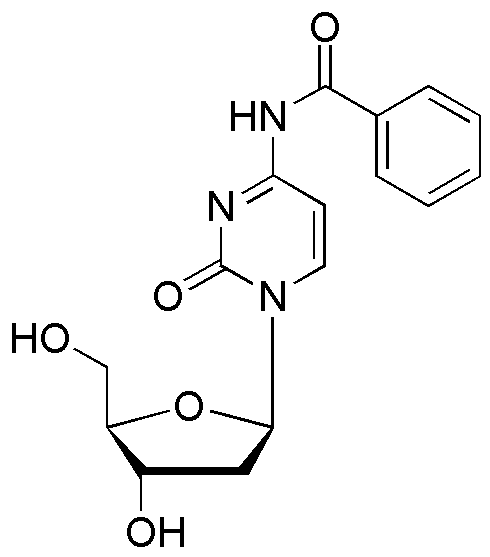N4-Benzoyl-2'-deoxycytidine is widely utilized in research focused on:
- Antiviral Research: This compound is studied for its potential in developing antiviral medications, particularly against viral infections like HIV, due to its ability to inhibit viral replication.
- DNA Synthesis: It serves as a building block in the synthesis of modified nucleotides, which are essential for creating DNA strands in genetic engineering and synthetic biology applications.
- Pharmaceutical Development: Researchers explore its properties to formulate new drugs that target specific cellular pathways, enhancing therapeutic efficacy while minimizing side effects.
- Biochemical Assays: It is used in various assays to study enzyme activity and interactions within cellular systems, providing insights into metabolic processes and disease mechanisms.
- Research in Epigenetics: The compound is investigated for its role in epigenetic modifications, helping scientists understand gene regulation and expression in different biological contexts.
General Information
Properties
Safety and Regulations
Applications
N4-Benzoyl-2'-deoxycytidine is widely utilized in research focused on:
- Antiviral Research: This compound is studied for its potential in developing antiviral medications, particularly against viral infections like HIV, due to its ability to inhibit viral replication.
- DNA Synthesis: It serves as a building block in the synthesis of modified nucleotides, which are essential for creating DNA strands in genetic engineering and synthetic biology applications.
- Pharmaceutical Development: Researchers explore its properties to formulate new drugs that target specific cellular pathways, enhancing therapeutic efficacy while minimizing side effects.
- Biochemical Assays: It is used in various assays to study enzyme activity and interactions within cellular systems, providing insights into metabolic processes and disease mechanisms.
- Research in Epigenetics: The compound is investigated for its role in epigenetic modifications, helping scientists understand gene regulation and expression in different biological contexts.
Documents
Safety Data Sheets (SDS)
The SDS provides comprehensive safety information on handling, storage, and disposal of the product.
Product Specification (PS)
The PS provides a comprehensive breakdown of the product’s properties, including chemical composition, physical state, purity, and storage requirements. It also details acceptable quality ranges and the product's intended applications.
Certificates of Analysis (COA)
Search for Certificates of Analysis (COA) by entering the products Lot Number. Lot and Batch Numbers can be found on a product’s label following the words ‘Lot’ or ‘Batch’.
*Catalog Number
*Lot Number
Certificates Of Origin (COO)
This COO confirms the country where the product was manufactured, and also details the materials and components used in it and whether it is derived from natural, synthetic, or other specific sources. This certificate may be required for customs, trade, and regulatory compliance.
*Catalog Number
*Lot Number
Safety Data Sheets (SDS)
The SDS provides comprehensive safety information on handling, storage, and disposal of the product.
DownloadProduct Specification (PS)
The PS provides a comprehensive breakdown of the product’s properties, including chemical composition, physical state, purity, and storage requirements. It also details acceptable quality ranges and the product's intended applications.
DownloadCertificates of Analysis (COA)
Search for Certificates of Analysis (COA) by entering the products Lot Number. Lot and Batch Numbers can be found on a product’s label following the words ‘Lot’ or ‘Batch’.
*Catalog Number
*Lot Number
Certificates Of Origin (COO)
This COO confirms the country where the product was manufactured, and also details the materials and components used in it and whether it is derived from natural, synthetic, or other specific sources. This certificate may be required for customs, trade, and regulatory compliance.


